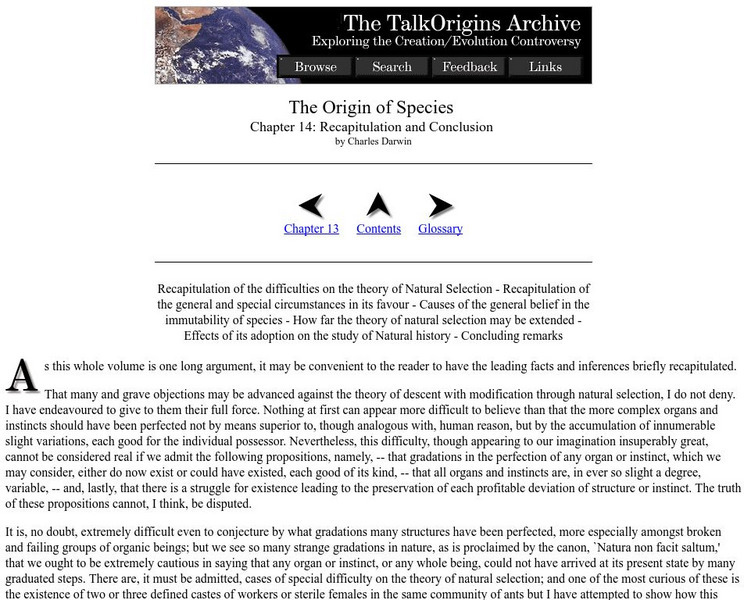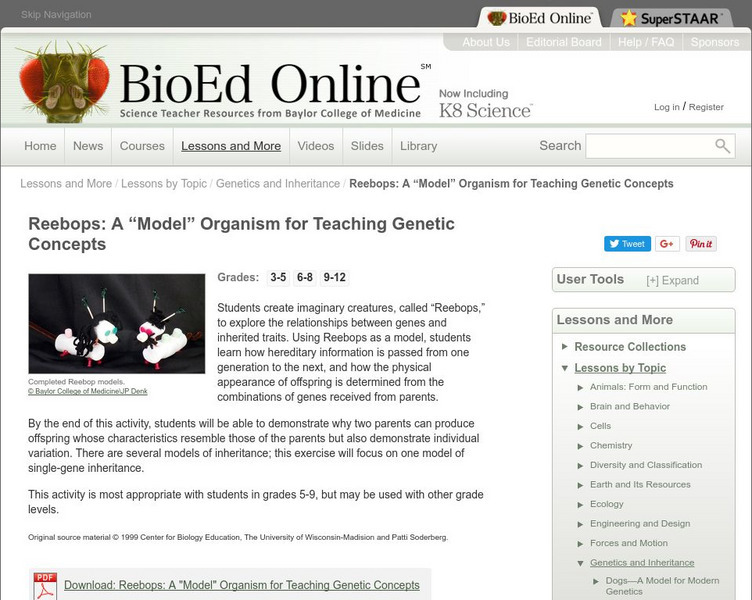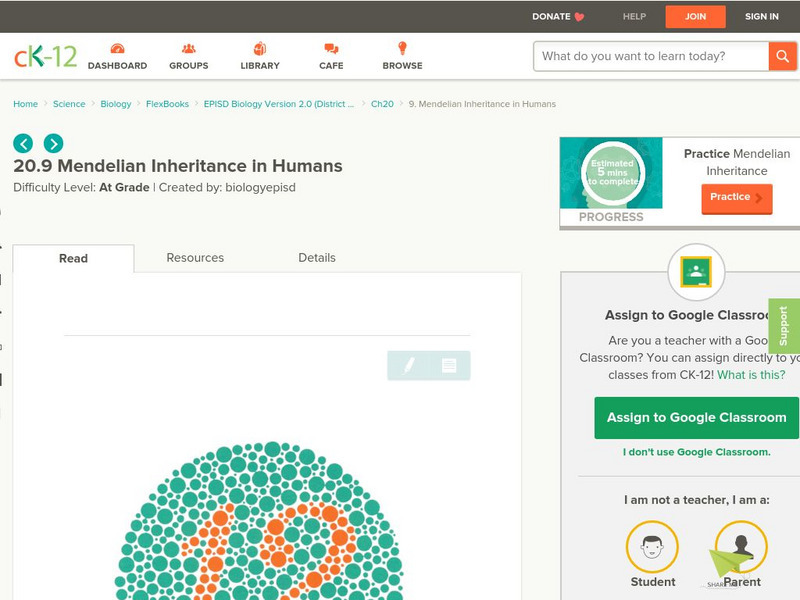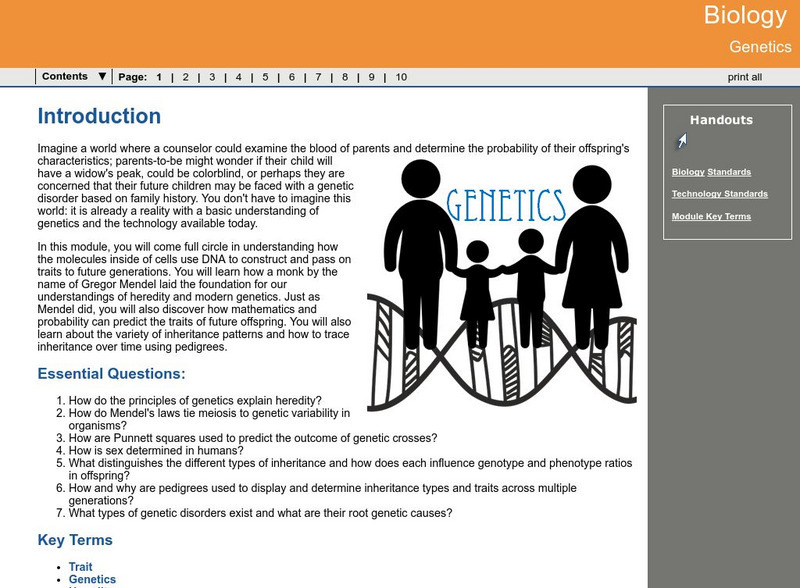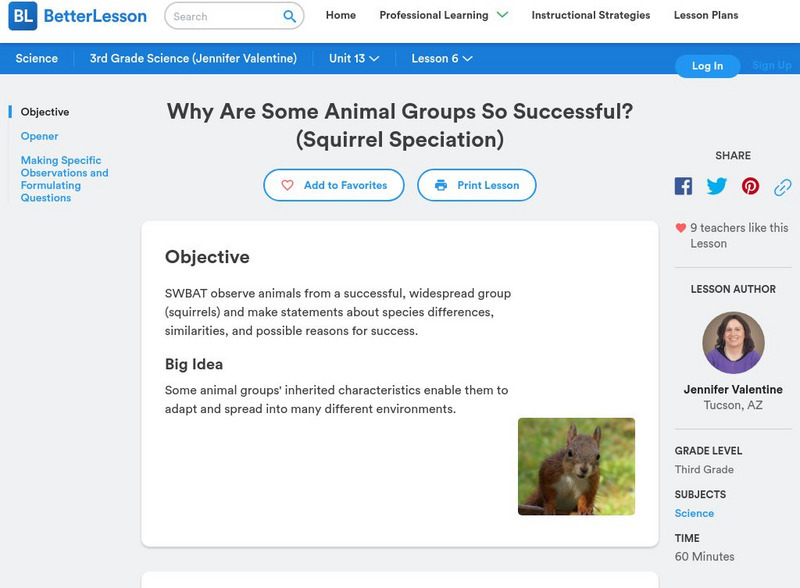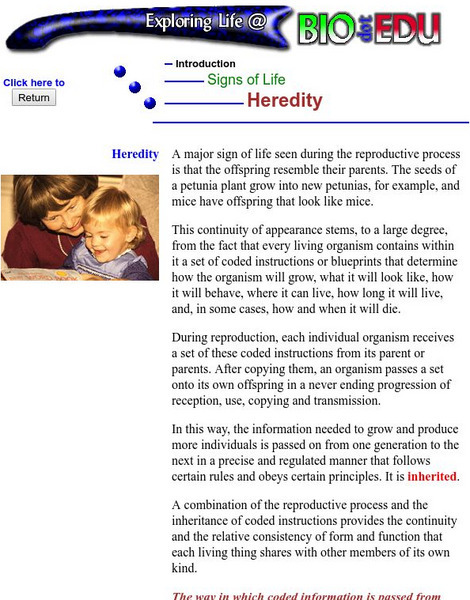Talk Origins Archive
The Origin of Species, Chapter 14
The entire text of Charles Darwin's book, The Origin of Species is available on this site. This link is specifically for the chapter that discusses embryology as evidence for evolution.
BioEd Online
Bio Ed Online: Reebops: A "Model" Organism for Teaching Genetic Concepts
In this lesson students create imaginary creatures, called "Reebops," to explore the relationships between genes and inherited traits. Using Reebops as a model, students learn how hereditary information is passed from one generation to...
CK-12 Foundation
Ck 12: Episd: Mendelian Inheritance in Humans
[Free Registration/Login may be required to access all resource tools.] While studying genetics, students will investigate sex-linked genes and what inherited diseases are associated with the genes. Students will also explore pedigree...
Georgia Department of Education
Ga Virtual Learning: Biology: Genetics
Through informational text, interactive activities, practice problems, and video clips, students analyze how biological traits are passed on to successive generations.
University of Utah
University of Utah: learn.genetics: Ptc: The Genetics of Bitter Taste
Read about the PTC gene, and listen to scientists discuss this accidental discovery which lead to important clues about human evolution.
OpenStax
Open Stax: Anatomy & Physiology: Patterns of Inheritance
Students learn about patterns of inheritance including genotype and phenotype, and then learn about the inheritance of autosomal dominant and recessive and sex-linked genetic disorders.
Better Lesson
Better Lesson: Why Are Some Animal Groups So Successful?
Using squirrels as an example, students will understand that some animal groups' inherited traits enable them to adapt and spread into many environments. Included in this lesson are videos showing the lesson in action, discussion...
Center for Innovation in Engineering and Science Education, Stevens Institute of Technology
Ciese: Human Genetics Project: Is the Dominant Trait Most Prevalent?
Human-Genetics: A Worldwide Search for the Dominant Trait allows you to collect data and share your results with students around the world. Register your class, complete the student survey, participate in discussion boards, and interact...
Other
Suny: Biology: Pedigree Analysis
Pedigree inheritance is a method of examining inherited traits. Learn how to use this method and develop conclusions through these examples.
Trinity University
Trinity University: Inherited Traits Versus Learned Behaviors [4Th Grade]
In this extremely detailed unit, young scholars will learn the about innate and learned characteristics in animals and humans through a series of teacher and student-led discussions, readings, reflections, learning activities, and...
University of Washington
Genome Sciences Education Outreach: State Your Traits [Pdf]
Multi-activity instructional activity in which young scholars engage in learning about the inheritance of genetic traits.
ArtsNow
Arts Now Learning: The Gene Connection Show [Pdf]
Fifth graders will discover the difference between inherited traits and learned behaviors by bringing the traits to life in a game of charades. After that, the students will demonstrate knowledge of recessive and dominant traits as they...
The Wonder of Science
The Wonder of Science: 3 Ls3 1: Inheritance and Variation of Traits
Work samples, phenomena, assessment templates, and videos that directly address standard 3-LS3-1: inheritance and variation of traits.
Concord Consortium
Concord Consortium: Stem Resources: The Virtual Field
A virtual lab that explores how offspring inherit different traits from their parents. Investigate these traits both in animals and plants. Understand that variations in offspring can lead to traits that allow survival. Lab includes...
City University of New York
Brooklyn College: Heredity
A very brief introduction to the meaning of heredity as a major characteristic of living things.
Beacon Learning Center
Beacon Learning Center: Where Did You Get Those Genes?
Join Professor Mill Ennium and his lab assistants as he helps Phoenix discover why he looks like a relative.
Khan Academy
Khan Academy: Polygenic Inheritance and Environmental Effects
Learn about traits that are controlled by multiple genes and/or influenced by the environment. Understand penetrance and expressivity.
New York University
Nyu: Darwin's Evidence for Evolution: Embryology
Concise description of embryology as evidence for evolution, as used by Darwin.
CPALMS
Cpalms: Inherited and Learned Behaviors
View this slideshow containing vibrant pictures, examples, and easy to understand text to learn the difference between inherited and acquired traits.
Oak Ridge National Laboratory
Oak Ridge National Laboratory: Behavioral Genetics
A useful introduction from the Oak Ridge National Laboratory on the study of how genetics and behavior are linked. Many useful resource links are included.
ArtsNow
Arts Now Learning: Super Gene [Pdf]
For this lesson, 5th graders learn about basic genetics and how genes can affect someone's behavior. They will write their own narrative about a character they create as a class in order to illustrate the effects of inherited traits and...
Agriculture in the Classroom
National Agricultural Literacy Curriculum: From Chicken Little to Chicken Big
Students will identify different breeds of chickens, examine physical characteristics, and determine the stages of a chicken's life cycle.
Better Lesson
Better Lesson: Mammals and Their Parents, Perfect Together
Third graders identify and interpret traits that are found in mammals by noticing differences among animals of the same species. Make a claim that traits are inherited from parents that is supported by evidence.
Alabama Learning Exchange
Alex: Where Did You Get Those "Jeans"?
This lesson can be interdisciplinary involving science, mathematics, and language arts. The primary nature of the lesson is inquiry, project, and technology-based. In science this project is a culminating activity in the heredity unit.


